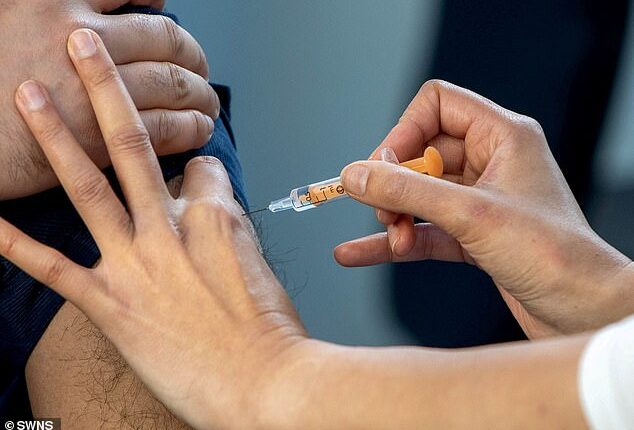The flu vaccine given to millions may be much less effective than expected as a pre-Christmas outbreak sweeps Britain, experts warn.
Last week, the NHS announced that the flu season had begun earlier than usual, with four times as many individuals hospitalized due to the virus compared to the same period last year.
This is despite the fact that more than 15 million eligible Britons have had the latest flu vaccine since September – an above average uptake for the jab which reduces the risk of infection and serious symptoms.
Now, experts are warning that the vaccine – which is updated every year to protect against the latest form of flu – may provide inadequate protection against the version of the virus spreading in the UK.
The vaccine rolled out in Britain is modelled on the jab used in southern hemisphere countries like Australia and New Zealand which had their winter flu season six months ago.
This is because the same form of flu which affected those countries usually reaches the UK in the winter months.
But data suggests that, this year, the vaccine was around 30 per cent less effective than normal in those countries.
In parts of Australia, the Government was forced to implement emergency measures to boost the number of nurses, hospital beds and medical clinics after the worst flu outbreak in seven years saw thousands hospitalised.

The flu vaccine given to millions may be much less effective than expected as a pre-Christmas outbreak sweeps Britain

Data suggests that, this year, the vaccine was around 30 per cent less effective than normal in those countries (Stock Image)
Experts have warned that an ineffective flu vaccine – known as a mismatch – could trigger an NHS crisis, with routine procedures like hip replacements and eye surgery cancelled and lengthy delays for ambulances and A&E admission.
In 2017, a mismatched flu vaccine was responsible for 50,000 extra deaths in the UK, according to the Office of National Statistics.
‘Looking at the numbers of people being hospitalised, it’s clear the kick-off rate is much steeper this year,’ says Penny Ward, visiting professor in pharmaceutical medicine at King’s College, London.
‘A well-matched flu vaccine should provide around 60 to 70 per cent protection from hospitalisation.
‘But data suggests the southern hemisphere vaccine which ours is modelled on was only 40 per cent effective – which is quite low.
‘It’s possible we have a vaccine that is badly matched to the virus strains that are circulating.’
Flu, or influenza, is responsible for around 40,000 hospitalisations and more than 10,000 deaths in the UK every year.
The symptoms typically include fever, sore throat, muscle aches and a cough.
People over the age of 65, pregnant women and those with underlying health conditions are all more at-risk of life-threatening symptoms.
Every year, these groups, along with NHS staff and carers, are offered a vaccine.
The jab does not provide complete protection against the virus, but reduces the risk of dangerous symptoms and infection.
Last week, NHS chiefs warned of a potential ‘quad-demic’ with rising cases of flu, Covid, respiratory syncytial virus (RSV), and the stomach bug norovirus.
Around 95 per cent of hospital beds in England were occupied each day last week, the highest figure on record for this time of year.

People over the age of 65, pregnant women and those with underlying health conditions are all more at-risk of life-threatening symptoms (Stock Image)

Around 95 per cent of hospital beds in England were occupied each day last week, the highest figure on record for this time of year
Experts say it is too soon to consider implementing Covid-style social restrictions like face masks or social distancing.
However, they say there are steps people can take to reducing the risk of infection.
‘If you are showing symptoms of flu or Covid-19 such as a high temperature, cough, and feeling tired and achy, try to limit your contact with others, especially those who are vulnerable,’ says Dr Alexander Allen, consultant epidemiologist, at the UK Health Security Agency
‘Washing your hands regularly and using tissues can also help to reduce the spread of illness.’
Experts also say that, even if the vaccine is less protective than usual, it is still the most effective measure of reducing serious illness.
‘It’s better to receive a vaccine that is well matched to the strain you encounter,’ says Prof Ward.
‘But even if the vaccine is not a good match, it still offers protection against more severe disease.’










